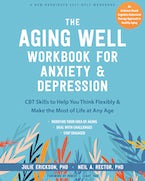By Julie Erickson, PhD, coauthor of The Aging Well Workbook for Anxiety and Depression
In a youth-obsessed society where we’re taught to avoid aging like the plague, it can feel almost impossible to have a positive outlook on growing older. Many people believe that your later years are reduced to a series of depressing losses: your physical health declines, your spouse and friends die, your memory fades, and your independence whittles away along with your hairline. Ageist stereotypes don’t help either as they tend to paint older adults as less capable, resistant to change, cranky, asexual, technologically illiterate, and out of touch.
Negative beliefs about aging are harmful to everyone. Research suggests that when you believe in the negative stereotypes of aging, you’re less likely to take risks or try to learn new things, and are at higher risk of physical decline and mortality. At a societal level these beliefs marginalize older adults, leave them prone to ageism and discrimination, and prevent them from being more visible and active members of our communities.
We could all use a perspective shift on growing older, not only to help ourselves as we age, but to treat the older adults in our lives with the reverence and respect that they deserve. To help challenge your beliefs about aging, consider doing the following:
1. Look for Exceptions
We’re all prone to confirmation bias, which makes us more likely to pay attention to and remember the ways in which an older adult confirmed a negative belief about aging as opposed to disconfirmed them. In order to develop a more balanced view of growing older, look for exceptions to your negative beliefs. If you think growing older means becoming irrelevant and inactive, take note of exceptions in public figures such as Jane Fonda, who continues to be highly involved in political activism and has been starring in blockbuster movies well into her eighties. Looking for these exceptions can help balance your perception of growing older.
2. Surround Yourself with Positive Role Models
The circle of people around you has tremendous influence in informing your expectations of growing older. Author Tim Ferris posits that “you are the average of the five people you most associate with.” So, if you’re spending time with older adults that are learning new things, staying engaged socially, pursuing meaningful goals, and approaching the challenges of aging with a healthy attitude, chances are this will rub off on you. Also consider what you are modelling to others about aging and how your comments or behavior might influence those around you, for better or for worse.
3. Look at the Gains and Not Just Loses
It can be easy to view late life as a series of depressing losses. The problem with this narrative is that it’s woefully incomplete. Yes, aging does bring a variety of challenges and losses that are difficult, sad, scary, and overwhelming at times. But it also is accompanied by a number of significant psychological, social, and emotional benefits. Increased wisdom, emotional maturity, heightened focus on the present moment, ability to disengage from regret, and focusing on relationships that matter most are just a few of the socioemotional benefits of this time in life. You may want to reflect on other benefits by considering the unique strengths you’ve developed through a lifetime of experiences. This can help paint a more optimistic picture of late life.
As much as late life can present many challenges, don’t let a well-ingrained cultural narrative of aging distort the other positive aspects of this stage of life. If we can look at this time in life as a new stage of self-discovery and exploration—full of inherent wisdom and maturity—it becomes something to celebrate and even look forward to. Perhaps William Wordsworth said it best: “The wiser mind mourns less for what age takes away than what it leaves behind.”
Julie Erickson, PhD, is a clinical psychologist, and adjunct faculty member in the department of applied psychology and human development at the University of Toronto. She maintains an active clinical practice focusing on the treatment of adults across the lifespan.



 2024 Peace Playbook: 3 Tactics to Avoid Clashes with Your Partner
2024 Peace Playbook: 3 Tactics to Avoid Clashes with Your Partner